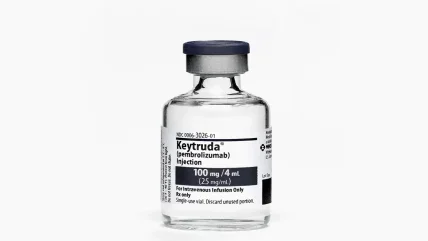
Merck (NYSE: MRK), known as MSD outside of the United States and Canada, announced that the European Medicines Agency’s Committee for Medicinal Products for Human Use (CHMP) adopted a positive opinion recommending approval of KEYTRUDA (pembrolizumab), Merck’s anti-PD-1 therapy, in combination with pemetrexed and platinum chemotherapy, for the first-line treatment of adult patients with unresectable non-epithelioid malignant pleural mesothelioma (MPM).
“The CHMP’s positive opinion marks an important milestone for patients in Europe with non-epithelioid mesothelioma, who experience worse survival outcomes than patients with epithelioid mesothelioma,” said Dr. Gregory Lubiniecki, vice president, oncology clinical research, Merck Research Laboratories. “The positive CHMP opinion moves us closer to offering a new first-line treatment option with a proven overall survival benefit for certain patients in the European Union with this difficult-to-treat cancer.”
The recommendation is based on results from the pivotal Phase 2/3 IND.227/KEYNOTE-483 trial. In IND.227/KEYNOTE-483, KEYTRUDA plus chemotherapy demonstrated a statistically significant improvement in overall survival (OS) versus chemotherapy alone. The CHMP’s recommendation will now be reviewed by the European Commission for marketing authorization in the European Union (EU), and a final decision is expected in the fourth quarter of 2024.
In September 2024, KEYTRUDA in combination with pemetrexed and platinum chemotherapy, was approved in the U.S. for the first-line treatment of adult patients with unresectable advanced or metastatic MPM based on results from the KEYNOTE-483 trial. KEYTRUDA plus chemotherapy demonstrated a statistically significant improvement in OS, reducing the risk of death by 21% (HR=0.79 [95% CI, 0.64-0.98]; p=0.0162) compared to chemotherapy alone at the trial’s pre-specified final analysis. Median OS was 17.3 months (95% CI, 14.4-21.3) for KEYTRUDA plus chemotherapy versus 16.1 months (95% CI, 13.1-18.2) for chemotherapy alone. KEYTRUDA plus chemotherapy also significantly improved progression-free survival (PFS) versus chemotherapy alone (HR=0.80 [95% CI, 0.65-0.99], p=0.0194; median PFS 7.1 months [95% CI, 6.9-8.1] versus 7.1 months [95% CI, 6.8-7.7], respectively). Overall response rate (ORR) was significantly higher for KEYTRUDA plus chemotherapy versus chemotherapy alone (52% [95% CI, 45.5-59.0] versus 29% [95% CI, 23.0-35.4], respectively; p<0.00001). Adverse reactions occurring in patients with MPM were generally similar to those in other patients receiving KEYTRUDA in combination with pemetrexed and platinum chemotherapy.






